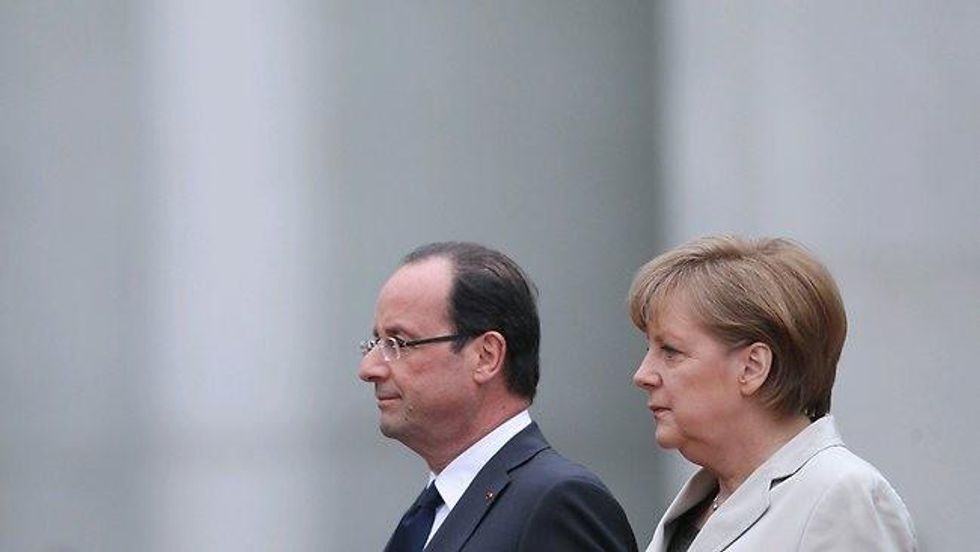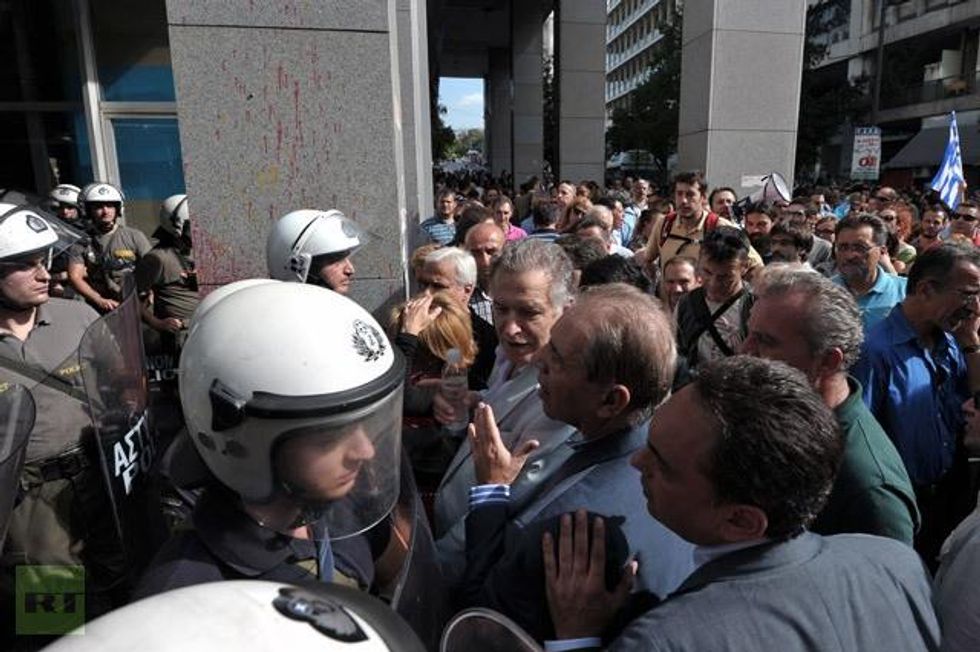Oct 17, 2012

Hollande's critique of European austerity policies, which have plagued recession-hit nations in the financial crisis fallout, comes the day before European leaders meet in Brussels to discuss policies going forward in the economic recovery and Greek anti-austerity protesters take to the streets in a countrywide general strike called by is major unions.
Touching on an array of topics tainting the Eurozone's staggering recovery, Hollande called on Germany to help balance out the now tilted Eurozone economy through tax cuts and wage increases in order to build economic strength from the ground up.
"The time has come to offer a perspective beyond austerity," Hollande said, acknowledging that countries such as Greece, Spain, and Portugal have already imposed excessive burdens on their citizens, "who had paid dear for others' excesses," in order to gain bailout funds from financial leaders in the Eurozone.
Hollande emphasized that Merkel's current push for a more centralized European system, which would even more closely control sovereign budgets and fiscal policies, was an erosion of democracy in the Eurozone. Instead, Holland vied for "a Europe that advances at varying speeds, with different circles," arguing for autonomous sovereign nations to regain control over their own budgets, while also receiving needed bailout funds from economic leaders.
Hollande warned that a France-Germany leadership in the Eurozone must be in lockstep as an "accelerating" force in the EU, but added, "it can also be the brake if it's not in step. Hence the need for Franco-German coherence."
He said: "I'll do everything for Greece to stay in the euro and have the resources it needs by the end of the year, without it having to be necessary to inflict new [austerity] conditions other than these already admitted by the Samaras government."
A heavy emphasis on austerity measures in the Eurozone has caused great hardship and unrest in countries such as Greece, Spain, Portugal, and Italy, who have seen skyrocketing unemployment, massive losses in pensions, public wages, and social services, and other resources drained from their respective public budgets.
As a result, vivacious anti-austerity protests continue to spill over at increasing rates.
Thousands of protesters took to the streets in a worldwide protest dubbed "Global Noise" on Saturday with the message, "we will not be silent," against austerity measures.
Greece, the site of the most frequent anti-austerity protests since the crisis, is set for another round of protests this week.
Greece's two largest labor unions, GSEE and ADEDY, which represent both public and private workers, have called for a 24-hour general strike on Oct. 18 that will shut down the country for the third time in one month.
Ahead of the strike, Greek journalists called a 24-hour news blackout on Wednesday, halting all news coverage for the entire day in protest of the country's austerity. The journalists, joined by hospital workers and court officials, took to the streets throughout the day.
Thursday's general strike and street protests arrive as Greek Prime Minister Antonis Samaras meets with European Union leaders, including Hollande and Merkel, at the EU Summit in Brussels for final negotiations regarding further bailout money for the country and a subsequent added austerity package of $17.45 billion in public spending cuts and tax hikes.
The EU Summit, set to take place in Brussels from Oct. 18-19 promises to be contentious given Hollande's line, now drawn in the sand, between German lead austerity and a less intrusive approach to economic recovery.

Join Us: News for people demanding a better world
Common Dreams is powered by optimists who believe in the power of informed and engaged citizens to ignite and enact change to make the world a better place. We're hundreds of thousands strong, but every single supporter makes the difference. Your contribution supports this bold media model—free, independent, and dedicated to reporting the facts every day. Stand with us in the fight for economic equality, social justice, human rights, and a more sustainable future. As a people-powered nonprofit news outlet, we cover the issues the corporate media never will. Join with us today! |
Our work is licensed under Creative Commons (CC BY-NC-ND 3.0). Feel free to republish and share widely.

Hollande's critique of European austerity policies, which have plagued recession-hit nations in the financial crisis fallout, comes the day before European leaders meet in Brussels to discuss policies going forward in the economic recovery and Greek anti-austerity protesters take to the streets in a countrywide general strike called by is major unions.
Touching on an array of topics tainting the Eurozone's staggering recovery, Hollande called on Germany to help balance out the now tilted Eurozone economy through tax cuts and wage increases in order to build economic strength from the ground up.
"The time has come to offer a perspective beyond austerity," Hollande said, acknowledging that countries such as Greece, Spain, and Portugal have already imposed excessive burdens on their citizens, "who had paid dear for others' excesses," in order to gain bailout funds from financial leaders in the Eurozone.
Hollande emphasized that Merkel's current push for a more centralized European system, which would even more closely control sovereign budgets and fiscal policies, was an erosion of democracy in the Eurozone. Instead, Holland vied for "a Europe that advances at varying speeds, with different circles," arguing for autonomous sovereign nations to regain control over their own budgets, while also receiving needed bailout funds from economic leaders.
Hollande warned that a France-Germany leadership in the Eurozone must be in lockstep as an "accelerating" force in the EU, but added, "it can also be the brake if it's not in step. Hence the need for Franco-German coherence."
He said: "I'll do everything for Greece to stay in the euro and have the resources it needs by the end of the year, without it having to be necessary to inflict new [austerity] conditions other than these already admitted by the Samaras government."
A heavy emphasis on austerity measures in the Eurozone has caused great hardship and unrest in countries such as Greece, Spain, Portugal, and Italy, who have seen skyrocketing unemployment, massive losses in pensions, public wages, and social services, and other resources drained from their respective public budgets.
As a result, vivacious anti-austerity protests continue to spill over at increasing rates.
Thousands of protesters took to the streets in a worldwide protest dubbed "Global Noise" on Saturday with the message, "we will not be silent," against austerity measures.
Greece, the site of the most frequent anti-austerity protests since the crisis, is set for another round of protests this week.
Greece's two largest labor unions, GSEE and ADEDY, which represent both public and private workers, have called for a 24-hour general strike on Oct. 18 that will shut down the country for the third time in one month.
Ahead of the strike, Greek journalists called a 24-hour news blackout on Wednesday, halting all news coverage for the entire day in protest of the country's austerity. The journalists, joined by hospital workers and court officials, took to the streets throughout the day.
Thursday's general strike and street protests arrive as Greek Prime Minister Antonis Samaras meets with European Union leaders, including Hollande and Merkel, at the EU Summit in Brussels for final negotiations regarding further bailout money for the country and a subsequent added austerity package of $17.45 billion in public spending cuts and tax hikes.
The EU Summit, set to take place in Brussels from Oct. 18-19 promises to be contentious given Hollande's line, now drawn in the sand, between German lead austerity and a less intrusive approach to economic recovery.


Hollande's critique of European austerity policies, which have plagued recession-hit nations in the financial crisis fallout, comes the day before European leaders meet in Brussels to discuss policies going forward in the economic recovery and Greek anti-austerity protesters take to the streets in a countrywide general strike called by is major unions.
Touching on an array of topics tainting the Eurozone's staggering recovery, Hollande called on Germany to help balance out the now tilted Eurozone economy through tax cuts and wage increases in order to build economic strength from the ground up.
"The time has come to offer a perspective beyond austerity," Hollande said, acknowledging that countries such as Greece, Spain, and Portugal have already imposed excessive burdens on their citizens, "who had paid dear for others' excesses," in order to gain bailout funds from financial leaders in the Eurozone.
Hollande emphasized that Merkel's current push for a more centralized European system, which would even more closely control sovereign budgets and fiscal policies, was an erosion of democracy in the Eurozone. Instead, Holland vied for "a Europe that advances at varying speeds, with different circles," arguing for autonomous sovereign nations to regain control over their own budgets, while also receiving needed bailout funds from economic leaders.
Hollande warned that a France-Germany leadership in the Eurozone must be in lockstep as an "accelerating" force in the EU, but added, "it can also be the brake if it's not in step. Hence the need for Franco-German coherence."
He said: "I'll do everything for Greece to stay in the euro and have the resources it needs by the end of the year, without it having to be necessary to inflict new [austerity] conditions other than these already admitted by the Samaras government."
A heavy emphasis on austerity measures in the Eurozone has caused great hardship and unrest in countries such as Greece, Spain, Portugal, and Italy, who have seen skyrocketing unemployment, massive losses in pensions, public wages, and social services, and other resources drained from their respective public budgets.
As a result, vivacious anti-austerity protests continue to spill over at increasing rates.
Thousands of protesters took to the streets in a worldwide protest dubbed "Global Noise" on Saturday with the message, "we will not be silent," against austerity measures.
Greece, the site of the most frequent anti-austerity protests since the crisis, is set for another round of protests this week.
Greece's two largest labor unions, GSEE and ADEDY, which represent both public and private workers, have called for a 24-hour general strike on Oct. 18 that will shut down the country for the third time in one month.
Ahead of the strike, Greek journalists called a 24-hour news blackout on Wednesday, halting all news coverage for the entire day in protest of the country's austerity. The journalists, joined by hospital workers and court officials, took to the streets throughout the day.
Thursday's general strike and street protests arrive as Greek Prime Minister Antonis Samaras meets with European Union leaders, including Hollande and Merkel, at the EU Summit in Brussels for final negotiations regarding further bailout money for the country and a subsequent added austerity package of $17.45 billion in public spending cuts and tax hikes.
The EU Summit, set to take place in Brussels from Oct. 18-19 promises to be contentious given Hollande's line, now drawn in the sand, between German lead austerity and a less intrusive approach to economic recovery.

We've had enough. The 1% own and operate the corporate media. They are doing everything they can to defend the status quo, squash dissent and protect the wealthy and the powerful. The Common Dreams media model is different. We cover the news that matters to the 99%. Our mission? To inform. To inspire. To ignite change for the common good. How? Nonprofit. Independent. Reader-supported. Free to read. Free to republish. Free to share. With no advertising. No paywalls. No selling of your data. Thousands of small donations fund our newsroom and allow us to continue publishing. Can you chip in? We can't do it without you. Thank you.